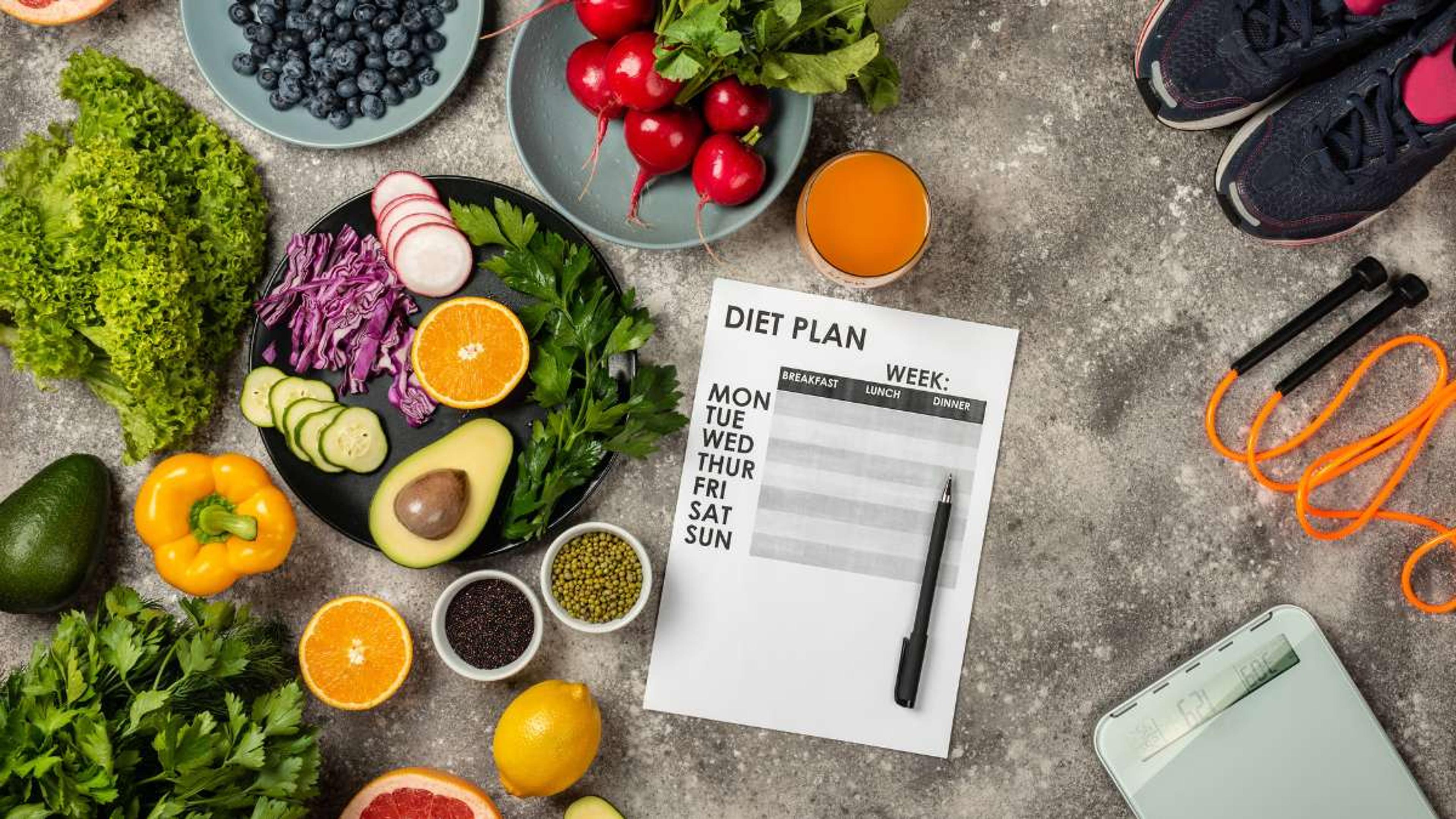Vegan Diet for Weight Gain: Simple and Effective Strategies

- Key Takeaways
- Understanding the Vegan Diet for Weight Gain
- Meal Planning for Weight Gain on a Vegan Diet
- Recommended Supplements for Weight Gain on a Vegan Diet
- Exercise and Weight Gain on a Vegan Diet
- Overcoming Challenges and Tracking Progress
- Tips for Weight Gain on a Vegan Diet
- Conclusion
- FAQs
Are you struggling to gain weight on a vegan diet? Contrary to popular belief, it's entirely possible and healthy to bulk up while enjoying plant-based foods. This article will guide you through the best high-calorie vegan options, strategic meal planning, beneficial supplementation, and ideal exercises for weight gain.
Prepare yourself for a wholesome journey towards reaching your weight goals - let's dive in!
Key Takeaways
- Gaining weight on a vegan diet is possible by incorporating protein-rich plant-based foods like brown rice, quinoa, beans, and lentils.
- Including healthy fats from avocado, nut butter, olive oil, and coconut products can support weight gain on a vegan diet.
- Balancing macronutrients (protein, carbohydrates, and dietary fats) is important for healthy weight gain on a vegan diet.
- Meal prepping and portion control are essential strategies to ensure nutritious meals and manage calorie intake when trying to gain weight on a vegan diet.
- Recommended supplements for weight gain on a vegan diet include protein, BCAA, creatine supplements (consult with healthcare professional), as well as omega-3 fatty acids and vitamin/mineral supplements like vitamin B12 and iron (especially important for vegans).
- Exercise plays an important role in gaining weight on a vegan diet. Resistance training (weightlifting) helps build muscle mass while cardio exercises improve cardiovascular health. Resting and recovering between workouts is crucial for muscle growth.
Understanding the Vegan Diet for Weight Gain
The world of nutrition has seen a shift towards plant-based diets in recent years, and it's no surprise that many individuals are now opting for a vegan lifestyle. Contrary to popular belief, following a vegan diet doesn't necessarily mean losing weight or struggling to maintain a healthy body mass. In fact, with the right approach, it is entirely possible to gain weight on a vegan diet while enjoying delicious plant-based meals.
So, how can you successfully bulk up on a vegan diet? It all starts with incorporating protein-rich plant-based foods with healthy fats and complex carbohydrates into your daily meals that support weight gain on a vegan diet.
Protein-rich plant-based foods
- Brown rice
- Quinoa
- Beans
- Legumes, like lentils and peas
Healthy fats and complex carbohydrates
- Avocado is full of healthy fats.
- Nut butter, like almond or peanut
- Cook with olive oil.
- Use vegan butter in meals and snacks.
- Dark chocolate is packed with good fats.
- Tahini, made from sesame seeds, is a healthy fat.
- Coconuts and coconut oil
- Brown rice is a great source of complex carbs.
- Eat oatmeal for breakfast to start your day with complex carbs.
- Quinoa gives you extra calories without added fats or sugars.
- Lentils are low in fat but high in filling fiber and protein.
- Chickpeas give you complex carbs and lots of nutrients too.
- Whole grain toast can be eaten at any meal for more complex carbs.
Meal Planning for Weight Gain on a Vegan Diet
To effectively plan meals for weight gain on a vegan diet, it is important to understand calorie density and calculate caloric needs. Additionally, incorporating high-calorie plant-based foods, balancing macronutrients, and practicing meal prepping and portion control are all essential strategies.

Understanding Calorie Density and Calculating caloric needs
To gain weight on a vegan diet, first and foremost, you need to have a clear understanding on calorie density and calculate your caloric needs.
Calorie density refers to the number of calories in a given amount of food. Some foods have more calories for the same portion size, while others have fewer. For weight gain, you want to focus on consuming more calorie-dense foods like nuts, seeds, avocados, nut butters, and plant-based oils like olive oil or coconut oil.
Calculating your caloric needs involves determining how many calories you should consume each day to reach your weight gain goals. Factors such as age, gender, activity level, and current weight play a role in calculating these needs.
Knowing calorie density and calculating caloric needs is crucial for weight gain on a vegan diet because it helps you create a proper meal plan that ensures you are consuming enough calories to support your goals. By understanding the calorie content of different foods and calculating your specific needs, you can make informed choices about the types and quantities of plant-based foods to include in your meals.
This knowledge allows you to incorporate high-calorie foods into your diet in a balanced way, ensuring that you are getting enough energy from healthy fats, proteins, and complex carbohydrates. Without considering calorie density and caloric needs, it can be challenging to gain healthy weight.
Best High Calorie Vegan Foods for Weight Gain

If you want to gain weight on a vegan diet, here are some of the best high-calorie vegan foods you can include in your meals:
- Nuts and Nut Butters: Peanut butter, almond butter, and cashew butter are excellent sources of healthy fats and calories.
- Avocado: It is rich in healthy fats and provides a good amount of calories.
- Beans and Lentils: These legumes are packed with protein, fiber, and carbohydrates, making them great for weight gain.
- Tofu: It is a versatile plant-based protein source that can be used in various dishes to add extra calories.
- Oats: They are a nutrient-dense whole grain that can be enjoyed as oatmeal or added to smoothies for extra calories.
- Olive Oil: It is an excellent source of healthy fats that can be used for cooking or drizzled over salads for added calories.
- Quinoa: This gluten-free grain is high in protein and complex carbohydrates, making it ideal for weight gain.
- Coconut Products: Coconut milk, coconut oil, and shredded coconut contain healthy fats that can boost your calorie intake.
- Dark Chocolate: It is a delicious treat that provides extra calories due to its high fat content.
- Dried Fruit: Dates, raisins, and other dried fruits are concentrated sources of calories that can be added to snacks or desserts.
Balancing macronutrients
Balancing macronutrients is an important aspect of weight gain on a vegan diet. Macronutrients refer to protein, carbohydrates, and dietary fats that our body needs in larger quantities.
To ensure proper weight gain, it's necessary to include all three macros in our meals. Vegan sources of protein can include tofu, lentils, chickpeas, and quinoa. Healthy fats like avocado, nuts, and seeds provide extra calories and nutrients.
Complex carbohydrates from foods like brown rice and sweet potatoes give us energy for workouts and muscle growth. By including these macronutrients in the right proportions, we can support healthy weight gain on a vegan diet.
Meal prepping and portion control
Meal prepping and portion control are essential strategies to consider when trying to gain weight on a vegan diet. By planning and preparing your meals in advance, you can ensure that you have nutritious options readily available.
This helps to prevent relying on unhealthy convenience foods or overeating due to hunger. Additionally, portion control allows you to manage your calorie intake effectively. By measuring out appropriate portions of protein-rich plant-based foods, healthy fats, and complex carbohydrates, you can ensure that you are consuming enough calories to support weight gain without going overboard.
So, make meal prepping and portion control a part of your vegan weight gain journey for optimal results!
Recommended Supplements for Weight Gain on a Vegan Diet
Include protein, BCAA, and creatine supplements to support muscle growth and recovery. Omega-3 fatty acid and vitamin/mineral supplements can also ensure adequate nutrient intake on a vegan diet.

Protein, BCAA, and creatine supplements
Protein, BCAA, and creatine supplements are beneficial for weight gain on a vegan diet. Before you opt for supplements it is crucial to understand your nutrient profile as is. Once you do, it is highly recommended that you discuss the supplements you intend to take with your nutritionist and health care provider, considering other conditions in your body. Here are some important facts on various supplements available:
- Creatine and β-alanine supplementation are popular supplements among athletes, including those following a vegan diet. Creatine is naturally produced in the body and stored in the muscles, where it plays a key role in energy production during high-intensity exercise.
- BCAA supplementation (branched-chain amino acids) are essential for muscle protein synthesis and can help prevent muscle breakdown during intense workouts. They are particularly beneficial for vegans who may have limited sources of dietary protein.
- Creatine supplementation can lead to weight gain by increasing muscle mass and water retention.
In addition to supplements, there are other strategies you can incorporate into your vegan weight gain journey. Meal prepping and portion control are essential for ensuring you consume enough calories to support weight gain without going overboard. By planning and preparing your meals in advance, you can ensure that you have nutritious and calorie-dense options available throughout the day.
Omega-3 fatty acid and Vitamin/Mineral Supplements
Taking omega-3 fatty acid and vitamin/mineral supplements can be helpful for weight gain on a vegan diet. These supplements provide important nutrients that may be lacking in plant-based diets. Here are some key supplements to consider:
- Omega-3 Fatty Acid Supplements: Since fish and seafood are common sources of omega-3 fatty acids, vegans may need to supplement their diet with sources like algae-based supplements or flaxseed oil capsules. These provide essential ALA, EPA, and DHA omega-3 fats for heart health and overall well-being.
- Vitamin B12 Supplements: Vitamin B12 is essential for nerve function, DNA synthesis, and the production of red blood cells. It is found mostly in animal products, so vegans should consider taking a B12 supplement or consuming foods fortified with this vitamin.
- Iron Supplements: Plant-based iron sources may not be as easily absorbed by the body as iron from animal products. Taking an iron supplement or incorporating iron-rich plant foods like lentils, tofu, and spinach into the diet can help meet iron needs.
- Calcium Supplements: Vegan diets can provide enough calcium through fortified plant milks, tofu, leafy greens, and nuts/seeds. However, if calcium intake falls short, supplements can ensure adequate bone health.
- Vitamin D Supplement: Vegans should consider taking a vitamin D supplement since it is mainly obtained from sunlight exposure and fortified dairy products – both often excluded from a vegan diet.
- Zinc Supplements: While zinc can be found in plant foods like legumes and whole grains, it may not always be properly absorbed by the body when consumed solely through plants alone. Consider taking a zinc supplement to help meet daily needs.
Exercise and Weight Gain on a Vegan Diet
Exercise is an essential component of weight gain on a vegan diet, particularly in building muscle mass. Regular strength training exercises can help promote muscle growth and increase overall weight. Incorporating exercises such as weightlifting, resistance training, and bodyweight exercises into your routine can be effective in stimulating muscle development.

Importance of resistance training and cardio
Resistance training and cardio are crucial for individuals following a vegan diet who want to gain weight. Resistance exercises, like weightlifting, help strengthen bones and manage chronic pain.
They can also aid in weight loss and increase bone density. On the other hand, cardio exercises improve cardiovascular health and endurance. These forms of exercise are particularly important for vegans because they can support overall health while helping them achieve their weight gain goals.
Rest and recovery for muscle growth
Rest and recovery are crucial components of muscle growth, regardless of the type of diet you follow. Taking time to rest allows your muscles to repair and rebuild, leading to increased strength and size over time.
Recovery is essential for the adaptations that occur in your muscles as a result of exercise and proper nutrition. Whether you're following a vegan or vegetarian diet, rest and recovery play an important role in gaining muscle mass and improving overall performance in sports and exercise.
So make sure to prioritize rest days, get enough sleep, and listen to your body's signals for optimal muscle growth on a vegan diet!
Overcoming Challenges and Tracking Progress
To overcome challenges and track progress on a vegan diet for weight gain, it is important to meet protein requirements and ensure nutrient adequacy. Manage digestion issues and cravings by incorporating a variety of plant-based foods.
Keep track of progress by monitoring weight, body measurements, and strength gains. Adjust the meal plan as needed to continue making progress towards weight gain goals.

Meeting protein requirements and ensuring nutrient adequacy
To meet protein requirements and ensure nutrient adequacy on a vegan diet, it's important to include a variety of plant-based protein sources in your meals. Foods like tofu, lentils, chickpeas, and quinoa are great options that provide essential amino acids.
Aim for about 0.9 grams of protein per kilogram of body weight each day.
In addition to protein, be sure to incorporate nutrient-dense foods into your meals. Include plenty of fruits and vegetables for vitamins and minerals, whole grains like brown rice or oats for fiber and energy, and healthy fats from sources like avocados, nuts, seeds, and olive oil.
By choosing a wide range of plant-based foods throughout the day while also considering portion sizes that are appropriate for your caloric needs, you can ensure that you're getting the necessary nutrients on a vegan diet.
Managing digestion issues and cravings
Including grains, beans, and legumes in a plant-based diet can help manage digestion issues and cravings. These foods contain fiber, which aids in digestion and helps regulate blood sugar levels.
Fiber also provides a feeling of fullness, reducing cravings for unhealthy snacks. Additionally, incorporating whole carbs like brown rice, quinoa, and sweet potatoes can prevent hunger and keep you satisfied throughout the day.
So if you're experiencing digestive problems or struggling with cravings on a vegan diet for weight gain, make sure to include these nutrient-rich plant-based foods in your meals.
Tracking progress and making adjustments as needed
To successfully gain weight on a vegan diet, it's important to track your progress and make adjustments along the way. This means keeping an eye on how your body is responding to the changes you're making and making any necessary tweaks to ensure you're heading in the right direction.
Remember, weight gain on a vegan diet isn't guaranteed for everyone, so monitoring your progress allows you to see if your efforts are paying off or if adjustments need to be made.
It's also essential to consult with a healthcare professional or registered dietitian who can provide guidance and support throughout your journey. By tracking your progress and making adjustments as needed, you can work towards achieving your desired weight gain goals in a healthy and sustainable way.
Tips for Weight Gain on a Vegan Diet
- Include calorie-dense foods like nuts, seeds, and avocados in your meals.
- Add healthy fats to your diet by cooking with olive oil or using vegan butter.
- Snack on protein-rich foods like chickpeas, lentils, or a handful of almonds.
- Increase your portion sizes to ensure you're getting enough calories.
- Make smoothies with plant-based protein powder and fruits for a nutrient-packed snack.
- Incorporate complex carbohydrates like quinoa, brown rice, and sweet potatoes into your meals.
- Stay consistent with meal planning and prepping to make sure you're eating enough throughout the day.
Conclusion
In conclusion, gaining weight on a vegan diet is attainable by incorporating high-calorie plant-based foods and adjusting your food intake accordingly. By focusing on protein-rich options like nuts, nut butters, tofu, and lentils, along with healthy fats from avocados and olive oil, you can promote muscle growth and achieve your weight gain goals.
Remember to track your progress, stay consistent with meal planning and exercise, and consult with a healthcare professional or registered dietitian for personalized guidance. Your vegan journey to a healthier weight awaits!
FAQs
1. Can a vegan diet help me gain weight?
Yes, a vegan diet can help you gain weight by providing calorie-dense foods such as nuts, seeds, avocados, and plant-based oils.
2. What are some high-calorie vegan foods for weight gain?
Some high-calorie vegan foods for weight gain include nut butter, tofu, quinoa, lentils, chickpeas, and coconut milk.
3. Are there any potential challenges with gaining weight on a vegan diet?
One challenge of gaining weight on a vegan diet is ensuring adequate protein intake. It's important to incorporate plant-based protein sources like legumes and soy products into your meals.
4. How can I create a balanced meal plan for healthy weight gain on a vegan diet?
To create a balanced meal plan for healthy weight gain on a vegan diet, include a variety of fruits, vegetables, whole grains, legumes or beans for protein and healthy fats from sources like nuts and seeds in each meal.

